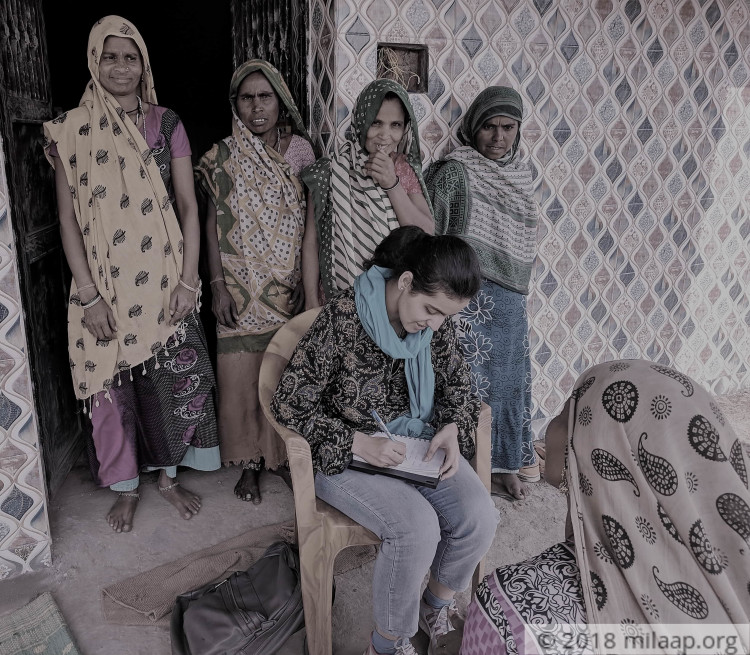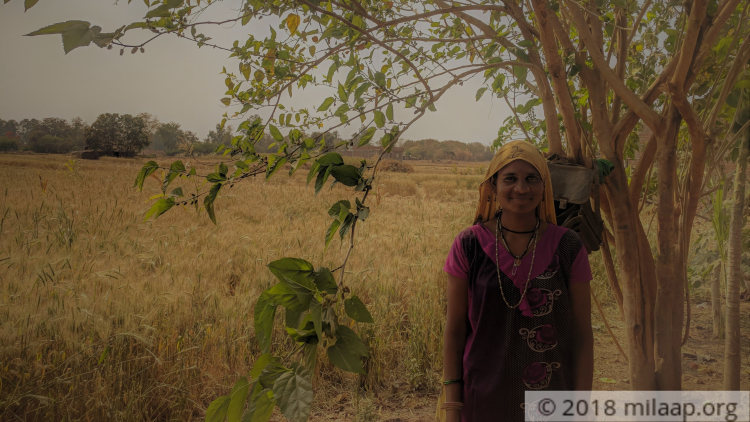“When you do a cartoon based on news headlines, you do it based on incomplete information” - Ted Rall, American columnist
I got a first-hand experience of having “Incomplete information” as I travelled to interiors of Dahod, the eastern district of Gujarat. Despite having lived in Rajasthan for 16 years and in Gujarat for 4 years during my undergraduate studies, I didn’t know much about the Bhil tribes prevalent in both these states.

But as a fellow with Milaap for just 2 months, I got to explore parts of Gujarat I didn’t even know existed during my 4 years in the state. Every location that I visited brought in new learnings but at the same time it created a mental framework to expect a particular lifestyle, work pattern and culture in a particular area.With this mental framework already in place after meeting 27 rural and tribal families, I didn’t expect anything extraordinarily different from the last family I had to meet that day
However as it happens, life often surprises you , you just have to be open to see the difference. So this is the story of my memorable encounter with “Madhuben Rameshbhai Amaliyar” on 23 Feb 2018.

She belongs to the Bhil tribe - the second largest tribe of India. With my incomplete information, I thought Bhil tribe was settled only in Rajasthan, but Gujarat has the second largest population of Bhils after Madhya Pradesh. She and the other families of the tribe have large plots of land where they mainly grow wheat, maize and vegetables. Agriculture is improving with a big beautiful lake in the vicinity. However even with all the resources, agriculture is not enough to sustain families with 5 - 6 members.

Hence these women and their husbands (yes I’m writing Madhuben and her husband and not the other way round), migrate to cities like Ahmedabad for daily labour work. Earning Rs 250 per day for 8 hours of hard labour, they are able to make a decent amount of money in 1-2 months before returning to their villages. Such hard labour work in scorching heat of 45 degree celsius is not everyone’s cup of tea and these families truly do justice to the warrior history of Bhil tribes (Bhil means “bow” and these tribal warriors fought against Mughals and British).
However the striking and sad fact about this tribe in Gujarat was revealed by Madhuben. She was married when she was 14 years old and her 2 daughters were married at the age of 16. Madhuben says that her daughters are lucky to have gone to school till class 9th but that was just to get food given in government schools as ultimately they have to be daily wage labourers and get married.
As we spoke more about her tribe, I found out that among them, the groom’s family gives dowry to the bride’s family. I was shocked and was filled with excitement to see this reverse dowry trend. However just like the “incomplete information” you find on internet, had the conversation ended here, it would be information that could have made the situation look gratifying. The gloomy truth was that the groom’s family paid the bride’s family to “buy” the girl from them. Based on how educated and beautiful the girl is, bride's families get anywhere from Rs 50,000 to Rs 3 lakhs . On top of that, the men in the girl’s family usually use this money for drinking and smoking and none of it put to good use. Now as the girl leaves her home with aspirations to lead a simple and peaceful married life, she finds that neither her husband’s home nor her own home, is hers anymore.
For most part of her life she hears - “Sab karna padhega, paise diye hain tere gharwalon ko” (We have paid your family, you have to do everything we ask you to do). She has to do all the housework, work in fields and do daily labour work as well. Infact Madhuben mentions that generally they get an operation done after having 4 kids, so that they can’t bear children. This is the only way to not have any more kids. She tells me that the government aided operation helps them get it free of cost (I felt proud of such schemes that truly empower the poor in this country).
So this is the story of Madhuben and many other Bhil tribal women like her in Gujarat . However, as we came close to the end of the conversation, she said that she has hopes for a brighter future for her grandchildren. Once again feeling proud of our government policies, I learnt that now Bhil families at least don’t get their daughters married before the age of 18 because they fear being jailed. In fact, some families are not even accepting any dowry, so that their daughters can voice their opinion and concerns in the family later.


With a ray of hope and changing perspective, Madhuben and all the tribal women in the area hope to study longer, work in companies or government offices and have better living situations.
I got a first-hand experience of having “Incomplete information” as I travelled to interiors of Dahod, the eastern district of Gujarat. Despite having lived in Rajasthan for 16 years and in Gujarat for 4 years during my undergraduate studies, I didn’t know much about the Bhil tribes prevalent in both these states.

But as a fellow with Milaap for just 2 months, I got to explore parts of Gujarat I didn’t even know existed during my 4 years in the state. Every location that I visited brought in new learnings but at the same time it created a mental framework to expect a particular lifestyle, work pattern and culture in a particular area.With this mental framework already in place after meeting 27 rural and tribal families, I didn’t expect anything extraordinarily different from the last family I had to meet that day
However as it happens, life often surprises you , you just have to be open to see the difference. So this is the story of my memorable encounter with “Madhuben Rameshbhai Amaliyar” on 23 Feb 2018.

She belongs to the Bhil tribe - the second largest tribe of India. With my incomplete information, I thought Bhil tribe was settled only in Rajasthan, but Gujarat has the second largest population of Bhils after Madhya Pradesh. She and the other families of the tribe have large plots of land where they mainly grow wheat, maize and vegetables. Agriculture is improving with a big beautiful lake in the vicinity. However even with all the resources, agriculture is not enough to sustain families with 5 - 6 members.

Hence these women and their husbands (yes I’m writing Madhuben and her husband and not the other way round), migrate to cities like Ahmedabad for daily labour work. Earning Rs 250 per day for 8 hours of hard labour, they are able to make a decent amount of money in 1-2 months before returning to their villages. Such hard labour work in scorching heat of 45 degree celsius is not everyone’s cup of tea and these families truly do justice to the warrior history of Bhil tribes (Bhil means “bow” and these tribal warriors fought against Mughals and British).
However the striking and sad fact about this tribe in Gujarat was revealed by Madhuben. She was married when she was 14 years old and her 2 daughters were married at the age of 16. Madhuben says that her daughters are lucky to have gone to school till class 9th but that was just to get food given in government schools as ultimately they have to be daily wage labourers and get married.
As we spoke more about her tribe, I found out that among them, the groom’s family gives dowry to the bride’s family. I was shocked and was filled with excitement to see this reverse dowry trend. However just like the “incomplete information” you find on internet, had the conversation ended here, it would be information that could have made the situation look gratifying. The gloomy truth was that the groom’s family paid the bride’s family to “buy” the girl from them. Based on how educated and beautiful the girl is, bride's families get anywhere from Rs 50,000 to Rs 3 lakhs . On top of that, the men in the girl’s family usually use this money for drinking and smoking and none of it put to good use. Now as the girl leaves her home with aspirations to lead a simple and peaceful married life, she finds that neither her husband’s home nor her own home, is hers anymore.
For most part of her life she hears - “Sab karna padhega, paise diye hain tere gharwalon ko” (We have paid your family, you have to do everything we ask you to do). She has to do all the housework, work in fields and do daily labour work as well. Infact Madhuben mentions that generally they get an operation done after having 4 kids, so that they can’t bear children. This is the only way to not have any more kids. She tells me that the government aided operation helps them get it free of cost (I felt proud of such schemes that truly empower the poor in this country).
So this is the story of Madhuben and many other Bhil tribal women like her in Gujarat . However, as we came close to the end of the conversation, she said that she has hopes for a brighter future for her grandchildren. Once again feeling proud of our government policies, I learnt that now Bhil families at least don’t get their daughters married before the age of 18 because they fear being jailed. In fact, some families are not even accepting any dowry, so that their daughters can voice their opinion and concerns in the family later.


With a ray of hope and changing perspective, Madhuben and all the tribal women in the area hope to study longer, work in companies or government offices and have better living situations.








